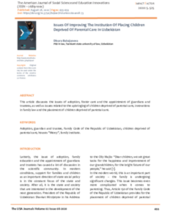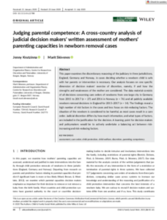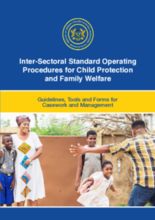Displaying 151 - 160 of 1759
This chapter of Care of the State: Relationships, Kinship and the State in Children’s Homes in Late Socialist Hungary explores negotiations between parents and state officials about the care of their children, showing that gendered norms of parenting and ‘appropriate’ family units were implicit parts of child protection policies in state socialist Hungary.
This article discusses the issues of adoption, foster care and the appointment of guardians and trustees, as well as issues related to the upbringing of children deprived of parental care, innovations in family law and the placement of children deprived of parental care in Uzbekistan.
This paper examines the discretionary reasoning of the judiciary in three jurisdictions, England, Germany and Norway, in cases deciding whether a newborn child is safe with her parents or intervention is necessary.
This article outlines the views of Indigenous practitioners collected as part of a doctoral study exploring the experiences of Aboriginal and Torres Strait Islander practitioners who undertake child protection work in Australia.
This Inter-Sectoral Standard Operating Procedure for child protection and family welfare (ISSOP) provides a harmonized framework of agreed standards, principles and procedures for all child protection and family welfare stakeholders in Ghana to understand each other’s roles and responsibilities.
This paper examines experts' perceptions of the aims and outcomes of public inquiries, before moving on to consider whether there are more effective and efficient ways of investigating national scandals.
This paper examines experts' perceptions of the aims and outcomes of public inquiries, before moving on to consider whether there are more effective and efficient ways of investigating national scandals.
This paper argues that whilst statutory services have expanded then contracted, children’s charities have remerged as the most influential voices that have shaped twenty-first century child protection policy and practice in the UK.
This study explores how male unaccompanied migrant children’s interactions with child protection staff in Greece shape their future trajectories as migrants.
In this article, the authors propose a definition of child well-being that draws on the economic literature pertaining to skill formation and human capital.



